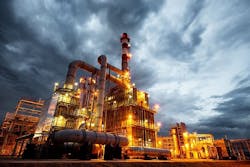Flint Hills Resources Building Second 27 MW Solar Project to Provide Electricity to Corpus Christi West Refinery
Flint Hills Resources is planning to build a second company-owned solar installation to help power its Corpus Christi West refinery. The refinery produces jet fuel, ultra-low sulfur diesel, gasoline, and the chemical building blocks used in everyday products.
The 27 MW solar installation will provide onsite, self-generated electricity directly to an oil refinery. Under optimal conditions, the solar installation is expected to benefit about one-third of the refinery's power needs.
The project will include approximately 56,700 panels and, upon completion, is expected to help lower annual energy costs, improve energy efficiency, and reduce grid emissions. It will be located on approximately 100 acres of the company's property across the west refinery complex off Interstate Highway 37 in Corpus Christi, TX.
The facility will produce enough solar energy to power more than 5,100 homes annually and has a peak capacity of roughly 28 percent of the refinery's power needs. The estimated cost of the project is $53 million.
"This is an uncommon project and exciting opportunity to integrate solar directly into a large refinery complex, reliably and at a lower cost than conventional retail power," said John Schroeder, DEPCOM's Executive Vice President of Distributed Energy. "You don't often see utility-scale projects for a single facility, and while this may be among the first projects of its kind at this scale in Texas, it won't be the last. Distributed solar generation is proving to be a competitive and reliable source of power for many energy-intensive industries."
Scottsdale, Arizona-based DEPCOM Power has been selected as the engineering, procurement and construction contractor for the project. Both Flint Hills Resources and DEPCOM are subsidiaries of Koch Companies. DEPCOM has completed construction of a similar 45 MW solar project at Flint Hills Resources' Pine Bend refinery in Rosemount, Minnesota.
Additionally, the Corpus Christi refinery operates a Combined Heat and Power (CHP) system, which provides about 30 MW of electricity. The CHP's cogeneration of electricity and steam is more efficient than producing them separately, and on-site electricity generation avoids the energy losses associated with long-distance transmission, transformation, and distribution of utility supply.
At peak capacity, CHP and solar installation is anticipated to benefit 60 percent of the refinery's daily power needs. The solar project also improves energy efficiency, while the emission reductions associated with the project are primarily Scope 2 GHG emissions.
